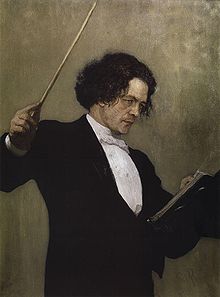- Christus (opera)
-
Anton Rubinstein  Operas
Operas- Dmitry Donskoy (1852)
- Fomka the Fool (1853)
- Die Kinder der Heide (1861)
- Feramors (1863)
- Der Thurm zu Babel (1870)
- The Demon (1871)
- Die Maccabäer (1875)
- Néron (1879)
- The Merchant Kalashnikov (1880)
- Christus (1895)
Christus is an opera in seven scenes with a prologue and epilogue by Anton Rubinstein, written between the years 1887-1893 to a libretto after a poem by Heinrich Bulthaupt.
Contents
Background
Christus was described by its composer as a 'sacred opera'. This is a term invented by Rubinstein, ('geistliche Oper' in German) denoting staged works with 'use of polyphonic choruses and a sober, edifying style relying on ‘exalted declamation’.'[1] Rubinstein composed three other works of this type, Sulamith, Moses and Der Thurm zu Babel (The Tower of Babel). A fifth sacred opera, Cain, was uncompleted at his death.
Rubinstein considered Christus to be his finest composition.[2]
Performance history
Parts of the work were performed in Berlin in April 1894, and Rubinstein conducted a complete performance in Stuttgart on 2 June 1894. This was in fact his last public appearance as a conductor.[3] The work received a further series of complete performances, at Bremen, in 1895. Applause between scenes and after the performance was forbidden.[4] Apparently the work was not revived until a performance in Tyumen in 2002, conducted by the composer's great-grandson, Anton Sharoyev. This was also therefore the work's first performance in Russia. A recording of past of the work was made from live performances under Sharoyev in St. Petersburg in 2003.[5]
Roles
Role Voice type Premiere Cast, June 2, 1894
(Conductor:Anton Rubinstein )Angel of the annunciation soprano Jesus Christ tenor Raimund von zur-Mühlen Satan bass John the Baptist baritone The Virgin Mary contralto Pontius Pilate baritone Judas Iscariot baritone Mary Magdalene soprano Chorus: mob, angels, demons, priests etc. Synopsis
Christus treats the life of Jesus according to the New Testament. It is made up of the following scenes:
- Outside the stable at Bethlehem; the three kings arrive to pay homage.
- Jesus arguing with Satan in the desert
- His baptism by John
- Jesus performs miracles and defends Mary Magdalene.
- Jesus's anger in the Temple
- The last supper and Jesus's arrest
- The trial before Pilate
- The crucifixion (off-stage): demons and angels battle.
- St Paul leads praise of Christ.
Sources
- Anon, Sleeve notes to recording of Christus; Anton Sharoyev conducting Tyumen State Philharominc Orchestra, 2003,"Zvuk" ZV - 11 03207
- Graham Dixon and Richard Taruskin. "Sacred opera." Grove Music Online accessed 17 April 2010
- H Krehbiel, A Second Book of Operas, accessed 17 April 2010
- Charles Maclean, Rubinstein as Composer for the Pianoforte (January–March 1914). Sammelbände der Internationalen Musikgesellschaft 15. Jahrg. (H. 2.): pp. 360–374.
- R. Taruskin, Christian Themes in Russian Opera: A Millennial Essay(March 1990). Cambridge Opera Journal, 2 (1): pp. 83–91.
Notes
Categories:- Operas by Anton Rubinstein
- German-language operas
- Operas
- Operas based on the Bible
- 1894 operas
Wikimedia Foundation. 2010.
